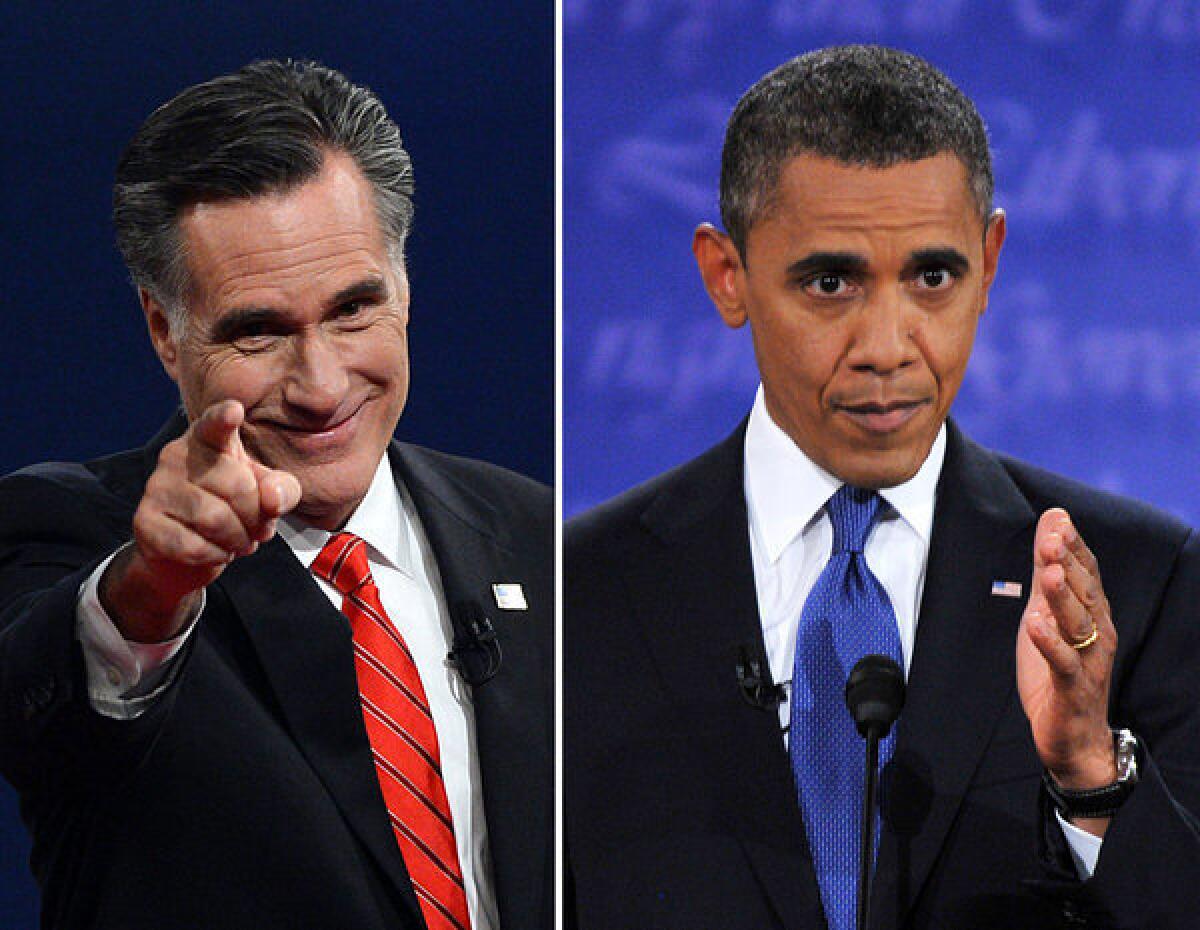McManus: Romney’s big bounce

Last week’s debate between President Obama and Mitt Romney was an even bigger win for Romney than it appeared at the time. That’s what the polls are telling us.
The debate, it seems, prompted swing voters to take a second look at the GOP candidate, and it also boosted Republican voters’ resolve to get out and vote.
As a result, a presidential election that once appeared to favor Obama is now razor close again, and heading toward an unpredictable finish.
TRANSCRIPT: First presidential debate
Four national polls released their first post-debate findings this week. The Pew Research Center reported that Romney had moved into the lead among likely voters, 49% to 45%. The Gallup Poll reported that Romney held a narrow lead, 49% to 47%. The Rasmussen Poll, which sometimes appears to favor Republicans, was kinder to Obama this time; it reported a tie at 48% each. And Reuters/IPSOS reported a tie at 45%.
The usual words of caution apply: These numbers are fallible snapshots of public opinion, not predictions of election outcomes. All polls come with a margin of error; the Pew survey’s margin of 3.4% means that Romney’s apparent 4-point lead could be either an even-larger advantage, or a virtual tie.
But when four major polls move in the same direction, it’s no mirage. The Romney campaign found new momentum in last week’s debate, and Obama hasn’t yet stopped it. Moreover, the Pew poll included fascinating data that suggest some of the reasons for Romney’s advance.
PHOTOS: 2012 presidential debate
One was a swing toward the Republican candidate on the issue of jobs, a word Romney used over and over in last week’s debate.
When Pew asked voters which candidate would do better on jobs, 49% named Romney against only 41% for Obama. Last month, when Pew asked the same question, the two candidates were tied. And when voters were asked whether they think Obama knows how to turn the economy around, most said he does not, 54% to 44%.
The poll also reported a
notable swing toward Romney among women. In a Pew poll last month, Obama had an 18% advantage among female voters; this week, women were evenly divided, 47% to 47%.
The news wasn’t all good for Romney, though. When voters were asked which candidate connects well with ordinary Americans, Obama was still far ahead. But on criteria that have often been more important to voters, such as whether a candidate is a strong leader or knows how to fix the economy, Romney appeared either even or ahead of the incumbent.
And pollsters reported that last week’s drop in the unemployment rate to 7.8% didn’t appear to help Obama much if at all.
It’s hard to know exactly what’s driving the shift in momentum we’re seeing in the polls. But here’s a working theory based on conversations with ordinary voters and strategists in both campaigns.
All summer long, the Obama campaign waged an effective blitz of advertising that made Romney into a caricature of a wealthy conservative with overseas bank accounts and secret tax records.
And Romney, unaccountably, pitched in to help. He delayed
the inevitable release of his tax
returns for months. He staged a Republican convention that reaffirmed his conservative credentials but offered thin gruel for swing voters. And he was caught on videotape dismissing almost half of Americans as people without a sense of personal responsibility.
That made the Obama campaign’s task seem easy: keep driving Romney’s negatives up.
But once the two candidates met on an equal footing in Denver, many voters were amazed to meet a Romney who seemed like an earnest businessman looking for ways to fix the economy — a Romney who insisted that, contrary to his previously stated positions, he didn’t want to cut taxes for the wealthy, abandon healthcare reform or reduce education spending (issues that polls find especially important to female voters).
Equally important, voters saw an incumbent president who, after reading last month’s lopsided polls in his favor, appeared to think he didn’t need to refresh his year-old talking points or break a sweat in his rebuttals.
The result was a debate that not only showed Romney at his best but reminded voters of Obama’s biggest vulnerability: that the economy is still ailing nearly four years into his term.
And that’s what produced this week’s remarkable poll numbers, and a reprieve from conservative conspiracy theories charging that the pollsters were cooking their numbers to make Obama look good.
Before last week’s debate, historians and pundits warned that debates rarely change the course of a campaign. This time turned out to be one of the exceptions. Obama needs to hope next week’s rematch also defies expectation and changes minds — this time with him as the beneficiary. But to do that, he’s going to need more than just crisper rebuttals to Romney’s best zingers.
He’ll need to remind swing voters why they once admired him.
He’ll need to make his economic plan sound fresh and promising.
He’ll need to present himself in a way that makes swing voters take a second look.
In other words, he’ll need to do just what Romney managed to do in Denver.
Follow Doyle McManus on Twitter @DoyleMcManus
More to Read
A cure for the common opinion
Get thought-provoking perspectives with our weekly newsletter.
You may occasionally receive promotional content from the Los Angeles Times.











